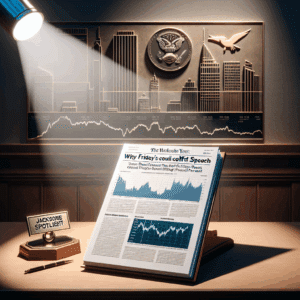As Federal Reserve Chair Jerome Powell prepares for what is likely his final keynote at the Jackson Hole Economic Symposium, investors and advisors are bracing for a speech that could redefine the Fed’s policy trajectory amid unprecedented political and economic turbulence. This isn’t just another Fed talk—it’s a pivotal moment that may reshape how we think about central bank independence, inflation control, and interest rate strategy going forward.
The Fed’s Independence: Under Siege but Standing Firm
Powell’s tenure has been marked by a steady commitment to the Fed’s independence, even under intense political fire from the Trump administration. The White House’s persistent pressure—ranging from demands for rate cuts to personal attacks on Fed officials—has tested the institution’s resolve. Notably, recent controversies involving Fed Governor Lisa Cook and the criticism of the Fed’s headquarters renovation highlight how politicized this traditionally apolitical institution has become.
What sets Powell apart is his ability to maintain a calm, data-driven approach despite the noise. Michael Arone of State Street Global Advisors praises Powell for “taking the high road” and focusing on the Fed’s dual mandate rather than political distractions. This speech will likely serve as Powell’s subtle yet firm defense of central bank independence—a message vital not only for markets but for the integrity of U.S. monetary policy.
What Investors Should Watch: Policy Signals and Market Expectations
Jackson Hole has historically been a stage for major Fed policy announcements. Since 2018, Powell’s speeches here have signaled shifts that markets eagerly parse for clues. This year, expectations revolve around a potential September rate cut amid signs of slowing economic growth and mixed labor market data.
However, the Fed remains divided. With only a couple of governors openly supporting a cut next month, Powell’s speech will be crucial in setting the tone. Goldman Sachs economist David Mericle suggests Powell will likely “support” a cut without outright committing, leaving room for flexibility depending on incoming data. This cautious stance reflects the Fed’s balancing act: easing enough to support growth but not so much as to fuel runaway inflation.
Inflation, Labor Market, and the Fed’s Framework Review
A key theme will be Powell’s assessment of inflation versus unemployment. Despite recent soft job growth numbers, many Fed officials describe the labor market as “solid,” which argues against urgent rate cuts. This nuance is critical for investors: a Fed that views the labor market as resilient may prioritize inflation control over aggressive easing.
The speech will also revisit the Fed’s 2020 shift to “flexible average inflation targeting,” a policy designed to support employment among underrepresented groups by allowing inflation to run hotter temporarily. The inflation surge since then, however, has prompted calls for a policy reset. Deutsche Bank’s Matthew Luzzetti anticipates Powell will signal a rollback of the 2020 framework, re-emphasizing preemptive inflation control.
What This Means for Investors and Advisors
-
Prepare for Volatility Around Jackson Hole: Powell’s nuanced messaging could unsettle markets, especially if he signals a more hawkish stance on inflation or downplays the need for an imminent rate cut. Investors should brace for short-term swings and avoid knee-jerk reactions.
-
Reassess Fixed Income Strategies: If the Fed reverts to a preemptive inflation control stance, bond yields may rise, pressuring fixed income portfolios. Advisors should consider duration management and inflation-protected securities to hedge against potential rate hikes.
-
Focus on Quality and Resilience in Equity Portfolios: With the labor market described as solid but inflation still a concern, companies with strong pricing power and balance sheets may outperform. Defensive sectors like consumer staples and healthcare could offer stability.
-
Watch for Political Risks: The politicization of the Fed adds an unpredictable layer. Investors should monitor developments closely, as further political interference could impact market confidence and Fed credibility.
A Unique Insight: The Silent Shift in Fed Communication
Beyond the headline rate decisions, what’s often missed is the Fed’s evolving communication strategy. Powell’s Jackson Hole speech may mark a subtle but significant shift toward more transparent, data-dependent guidance, moving away from pre-commitments to specific actions. This approach allows the Fed to remain nimble in a volatile environment but requires investors to be more vigilant in interpreting economic data and Fed commentary.
Looking Ahead: What’s Next?
The Fed’s next moves will hinge on incoming economic data—especially inflation trends and labor market signals. Advisors should prioritize flexible strategies that can adapt to either a gradual easing cycle or a more hawkish pivot if inflation proves stubborn.
Moreover, the broader implication of Powell’s speech is a potential reassertion of central bank independence at a time when political pressures threaten to undermine it. For investors, this underscores the importance of trusting in the Fed’s long-term commitment to its mandate, even amid short-term noise.
Final Thought
Powell’s Jackson Hole address is more than a policy update—it’s a defining moment for the Fed’s credibility and for market expectations in an era of uncertainty. Investors and advisors who tune in with a keen eye on the underlying themes—independence, inflation control, and communication strategy—will be best positioned to navigate the complex road ahead.
For those looking to stay ahead, this speech is a must-watch, and Extreme Investor Network will continue to provide exclusive, in-depth analysis as the story unfolds.
Sources:
- State Street Global Advisors commentary on Fed independence
- Goldman Sachs economic outlook on Jackson Hole expectations
- Deutsche Bank analysis on Fed policy framework changes
- Bureau of Labor Statistics recent employment data
Source: Powell to deliver Jackson Hole speech Friday. What Wall Street expects

